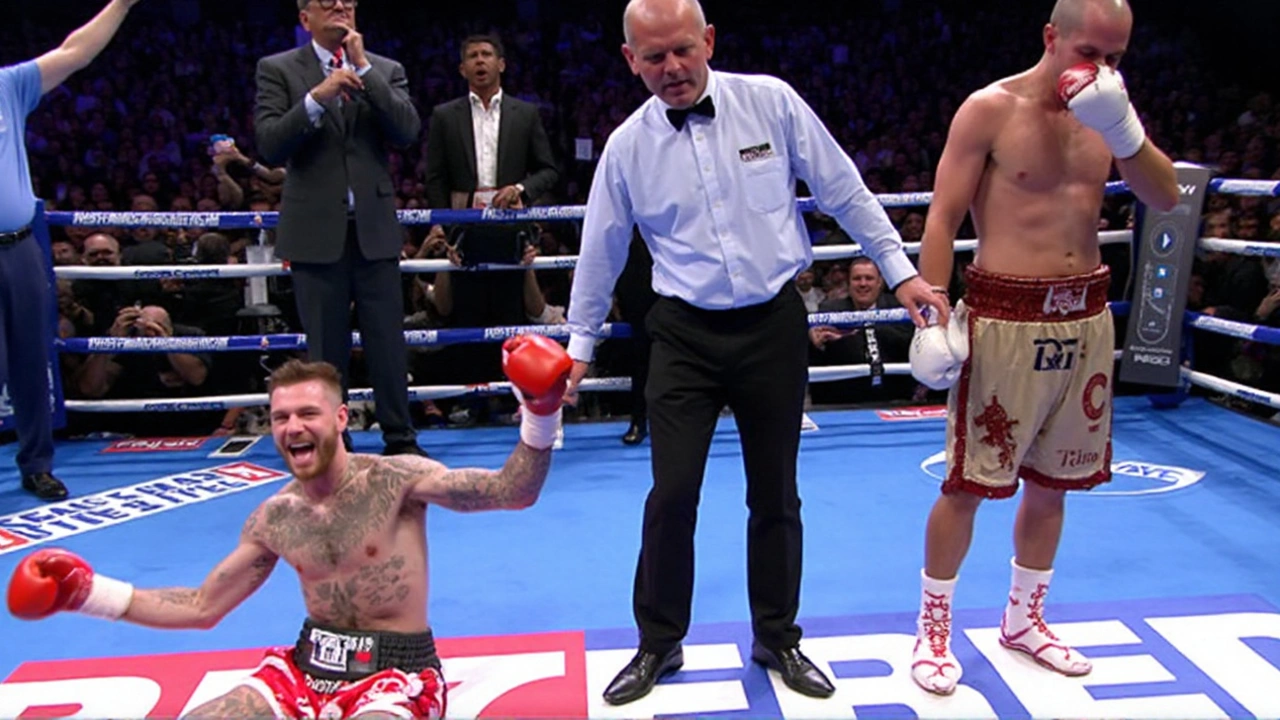Crocker floors Donovan twice and flips the script
Two knockdowns decided a world title in Belfast. Lewis Crocker, the underdog in his own city, endured a hot-and-cold rematch with Paddy Donovan and walked away with the belt by split decision. On a tense night at Windsor Park, the scorecards read 114-112 and 114-113 for Crocker, and 115-111 for Donovan. Those trips to the canvas in rounds three and five were the difference as the Belfast native claimed the IBF welterweight title and the biggest win of his career.
The story started long before the opening bell. Their first meeting back in March ended in chaos—Donovan was disqualified, and the messy finish left Crocker in tears, the rivalry raw, and the questions unresolved. This time there was no controversy about who landed the shots that mattered. Crocker landed them, clean and heavy, in front of a crowd that sang his name and then held its breath while the judges totted up their sums.
Donovan began like a man trying to reassert control of a rivalry he believed he owned. His jab was sharp, his feet urgent, and for a couple of rounds he bossed the geography of the ring. But Crocker wasn’t the same fighter Donovan saw in March. The Belfast man’s head movement, quieter and more disciplined now, kept him off the tramlines. He rolled, he dipped, and he made Donovan’s straight entries look inviting for counters.
The first big turning point came in the third. Crocker timed Donovan’s step-in, slipped just enough, and sent a short right hand over the top. Donovan went down hard, popped up fast, and tried to bluff it off, but the arena felt the momentum swing. Ten-eight round. Sudden silence from Donovan’s pocket of fans, a surge of noise from everyone else.
Round five might be the clip that gets played for years. Donovan pressed forward near the bell, squared up, and Crocker met him with a left hook that he did not see. Donovan’s legs betrayed him—his left knee seemed to give as he hit the canvas. He got up and finished the round, but there was a long look in his corner, the kind that tests the air for danger. Another 10-8. That’s the math that wins titles.
To Donovan’s credit, he gathered himself. In the middle frames he went back to basics: jab, step, touch the body, finish with the left hand. One of those lefts shook Crocker around the seventh, a reminder that the champion wasn’t going away quietly. The fight tightened. Rounds were suddenly close, a coin toss between Crocker’s counters and Donovan’s volume.
And then the soundtrack shifted. By the eighth, Windsor Park felt like a football terrace. “There’s only one Lewis Crocker,” rolled around the stands, and the challenger looked energised by it. He didn’t chase, he didn’t fall in love with power; he kept drawing Donovan onto shots, making him reset. That restraint—so often the missing piece for young punchers—was the quiet victory inside the big one.
The closing rounds were messy and tense. Donovan tried to steal back ground with quick bursts, reaching for momentum and maybe the memory of their first fight, when his angles and variety had torn through Crocker’s guard. But this time, Donovan’s entries were straighter and more predictable. Crocker read them, smothered them, and when he did trade, he did it on his terms—short hooks, compact rights, and quick exits.
At the bell, neither man celebrated like he knew. The cards reflected that: a wide swing for Donovan on one, narrow nods for Crocker on the other two. With two 10-8 rounds in the bank, Crocker forced Donovan to be nearly perfect in the rest. He wasn’t, and that’s how titles move.
- Official scores: 114-112 Crocker, 114-113 Crocker, 115-111 Donovan
- Knockdowns: Donovan down in rounds 3 and 5
- Records: Crocker 22-0 (12 KOs); Donovan 14-2 (11 KOs)
Afterward, Crocker said what a lot of people in Belfast were thinking: nobody expected this. He had been dismissed by many after the turmoil of March. Here, he looked like a fighter who had taken that week apart in the gym and put himself back together in the mirror. Sharper decisions. Smarter feet. Less ego in the exchanges.
Donovan, who dominated long stretches of the first bout before the disqualification, couldn’t summon the same rhythm. He was coming in on straight lines, not sliding around Crocker as he did before. The angles, the razors, the reckless confidence—missing. He landed enough to keep it honest, even rattled Crocker once, but he didn’t keep him off for long.
What the split decision means for the welterweight picture
Split decisions are like Rorschach tests. You can make a case for Donovan on activity and ring generalship in the middle rounds. You can make a case for Crocker on clean, damaging shots and the two knockdowns that tilt the ledger before you even argue about the swing frames. That’s how three judges can watch the same 36 minutes and land in different places without anyone having to cry robbery.
Two knockdowns matter because of the scoring. In most rounds, a winner gets 10 and the loser 9. A knockdown usually turns that into 10-8. Crocker landed two of those rounds. So if Donovan edged, say, five or six of the others by a whisker, the math still leaves the door open for the challenger to sneak ahead. That’s exactly what happened on two of the cards.
There’s another layer here: psychology. After the fifth-round knockdown, Donovan looked shaken and, at times, cautious. Crocker, by contrast, seemed to grow calmer, as though the fight had finally slowed down to a speed he could manage. That shift often decides close fights the judges have to untangle later with a pencil.
So what’s next? Crocker wasted no time angling for a name: Conor Benn. It’s a high-reward fight for British fans, noisy and lucrative, even if sanctioning politics can complicate things. It would also test Crocker against a pressure fighter who doesn’t mind trading in the pocket. If his patience in Belfast was real and repeatable, he’ll need it again.
There’s also the question of a third fight with Donovan. They’re one disqualification and one razor-thin decision into a rivalry that still feels unfinished. Donovan didn’t leave the ring broken. He looked stunned, yes, and emotional again in Belfast, but absolutely capable of rebuilding. If he brings back the angles and the looseness from the first encounter—and finds a way to avoid those counters—he’s still a live problem for anyone at 147.
Crocker’s age and record now carry a different weight. At 22-0 with 12 knockouts and a world strap on his shoulder, he’s moved from prospect to player. The belt guarantees options: homecoming defenses, cross-channel grudge matches, and, if he keeps winning, unification talk. That last bit takes patience and the right call at the right time. Still, nights like this tend to pull big-name opponents toward a city and a stadium that suddenly feel very profitable.
It’s worth noting how he did it, not just that he did it. The improvements were specific. Head off the center line. Hands coming back fast. Counters thrown from balance, not desperation. Those details are what separated him from the version of himself who got overwhelmed in March. You can see the homework in the habit changes, and habits are what don’t crumble when the temperature rises in round ten.
Donovan will have questions to answer that aren’t just about chin or heart—they’re about approach. Did he underestimate the changes coming his way? Did he fall in love with straight entries because they worked too easily last time? He’s at his best when he’s unpredictable, giving different looks, taking half-steps that bait counters and then punish them. If he leans back into that identity, the gap between these two shrinks again.
The atmosphere mattered. Windsor Park can swallow fighters who aren’t ready, but on Saturday it lifted the local man without rushing him. The crowd’s surge in the late rounds didn’t send Crocker chasing a finish he didn’t need. It steadied him. That kind of poise is a quiet tell that the stage didn’t outgrow the fighter.
As for the judging debate—of course it started before the gloves were even off. Some saw Donovan’s cleaner mid-round work as enough. Others pointed to the knockdowns and the heavier, more telling shots. That disagreement is baked into boxing. The tape will get picked apart in gyms and living rooms all week, and you can bet both corners will find five or six tiny moments they’ll swear swung the fight.
Still, the belt lives in Belfast now. Crocker has a champion’s problem set to solve: mandatory challengers, the politics of defenses, and the temptation to chase the biggest check before the most sensible fight. If he looks after the fundamentals—keep the defense honest, don’t reach for the stoppage, stack rounds—then the nights get bigger and the choices get cleaner.
Donovan leaves with a second tough memory from the same city, but also with the evidence that this was no gulf. He had Crocker buzzed in the middle rounds, he banked stretches of smart work, and he heard the uncertainty in the silence right before the decision. That’s not the sound you hear when you’ve been outclassed. It’s the sound you hear when everything came down to a few hard moments—and two clean knockdowns that he’ll want back more than anything.

